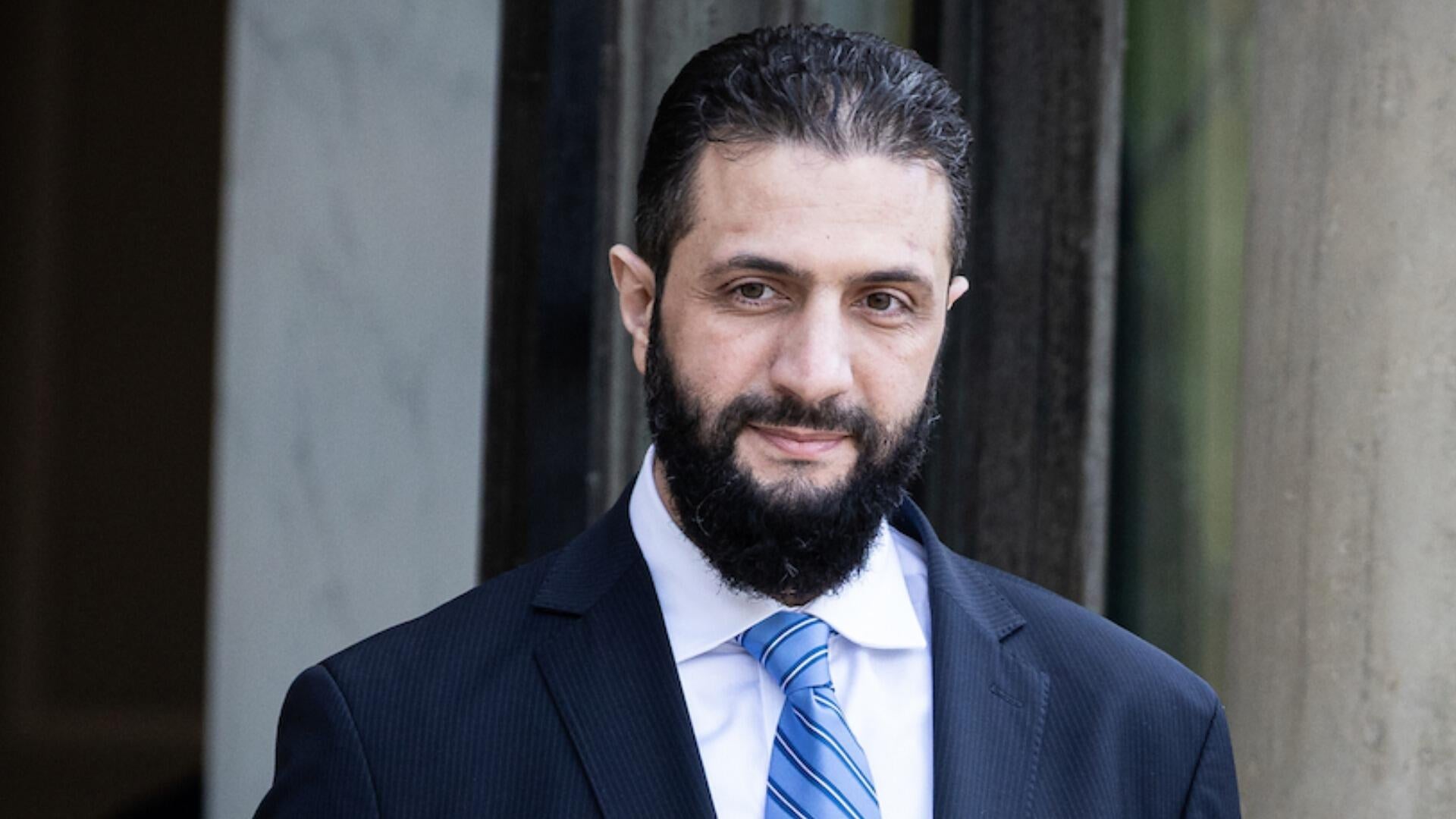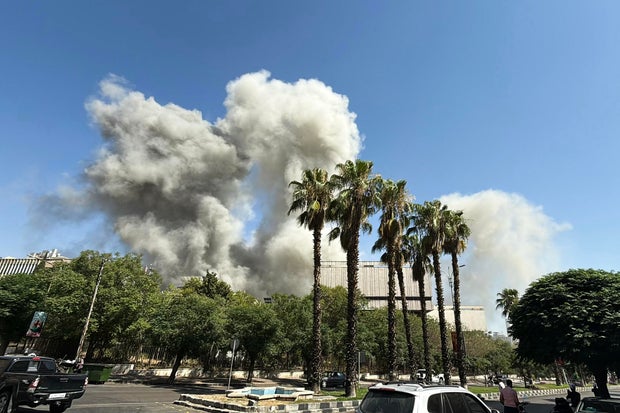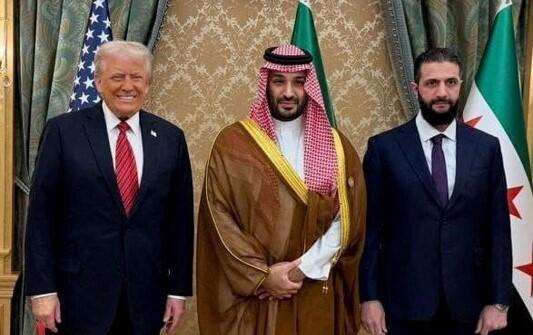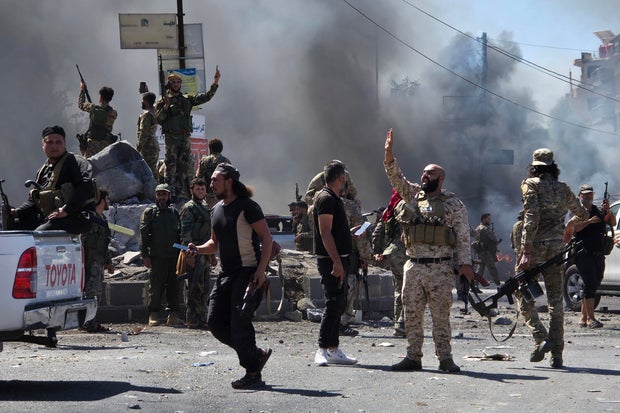Significance of Trump's meeting with Syrian leader

Damascus, Syria — The Israeli military launched a rare airstrike in the heart of Damascus on Wednesday, hitting the Syrian Defense Ministry headquarters and drawing a call from the Trump administration for "the fighting to stop" as clashes in the southern Syrian city of Sweida continued. Israel's attack came hours after a drone strike on the same building. Syrian state media reported a "number of casualties" without giving further details.
As clashes have raged for days in the city of Sweida, the capital of the province of the same name, between government forces and Druze armed groups, Israel has launched a series of strikes targeting government troops and convoys, which it says are in support of the religious minority group, and has vowed to escalate its involvement.
It has also beefed up its forces along its border with Syria.
 Smoke billows following Israeli strikes near the Syrian army and defense ministry headquarters in Damascus, Syria, July 16, 2025.
RAMI AL SAYED/AFP/Getty
Smoke billows following Israeli strikes near the Syrian army and defense ministry headquarters in Damascus, Syria, July 16, 2025.
RAMI AL SAYED/AFP/Getty
Israeli Defense Minister Israel Katz said after the airstrike in a post on X that the "painful blows have begun."
Trump administration "very concerned" over Israeli strikes in Syria
The Israeli strikes have raised concern in Washington, where the Trump administration has tried in recent weeks to help Syria's new government solidify control and build ties with the international community.
The U.S. lifted a wide range of sanctions against Syria in late June, and Treasury Secretary Scott Bessent said the moves were intended to encourage investment in the country.
"Syria must also continue to work towards becoming a stable country that is at peace, and today's actions will hopefully put the country on a path to a bright, prosperous, and stable future," Bessent said at the time.
On Wednesday, U.S. Secretary of State Marco Rubio said the Trump administration was "very concerned about Israel's strikes in Syria," adding: "We are talking with all relevant parties on all sides. We want the fighting to stop."
 A photo released on May 14, 2025, by the state-run Saudi Press Agency shows, from left, President Trump, Saudi Crown Prince Mohammed Bin Salman and Syrian President Ahmed al-Sharaa, during a meeting in Riyadh, Saudi Arabia.
Saudi Press Agency/Handout/REUTERS
A photo released on May 14, 2025, by the state-run Saudi Press Agency shows, from left, President Trump, Saudi Crown Prince Mohammed Bin Salman and Syrian President Ahmed al-Sharaa, during a meeting in Riyadh, Saudi Arabia.
Saudi Press Agency/Handout/REUTERS
Rubio called the clashes around Sweida "a direct threat to efforts to help build a peaceful and stable Syria," adding: "We have been and remain in repeated and constant talks with the governments of Syria and Israel on this matter."
A rebel offensive led by Islamist insurgent groups ousted Syria's longtime despotic leader, Bashar Assad, in December, sending him fleeing into exile in Russia and bringing an end to a nearly 14-year civil war. Since then, the country's new rulers have struggled to consolidate control.
The primarily Sunni Muslim government has faced suspicion from Syria's religious and ethnic minorities, whose fears increased after clashes between government forces and pro-Assad armed groups in March spiraled into sectarian revenge attacks. Hundreds of civilians of the Alawite religious minority, to which Assad belongs, were killed.
Syria's Defense Ministry had earlier blamed militias in the Druze-majority area of Sweida for violating a ceasefire agreement that had been reached Tuesday, causing Syrian army soldiers to return fire. It said they were "adhering to rules of engagement to protect residents, prevent harm, and ensure the safe return of those who left the city back to their homes."
But reports of attacks on civilians continued to surface, and Druze with family members in the conflict zone searched desperately for information about their fate amid communication blackouts.
Claims of government forces attacking Druze civilians
In Jaramana near the Syrian capital, Evelyn Azzam, 20, said she fears that her husband, Robert Kiwan, 23, is dead. The newlyweds live in the Damascus suburb, but Kiwan would commute to Sweida for work each morning and got trapped there when the clashes erupted.
Azzam said she was on the phone with Kiwan when security forces questioned him and a colleague about whether they were affiliated with Druze militias. When her husband's colleague raised his voice, she heard a gunshot. Kiwan was then shot while trying to intervene.
"They shot my husband in the hip from what I could gather," she said, struggling to hold back tears. "The ambulance took him to the hospital. Since then, we have no idea what has happened."
A Syrian Druze from Sweida living in the United Arab Emirates said her mother, father, and sister were hiding in a basement in their home near the hospital, where they could hear the sound of shelling and bullets from outside. She spoke on condition of anonymity out of fear her family might be targeted.
 Syrian security forces entered the predominantly Druze city of Sweida on July 15, 2025, following clashes between Bedouin tribes and Druze fighters.
SAM HARIRI/AFP/Getty
Syrian security forces entered the predominantly Druze city of Sweida on July 15, 2025, following clashes between Bedouin tribes and Druze fighters.
SAM HARIRI/AFP/Getty
She had struggled to get hold of them, but when she reached them, she said, "I heard them cry. I have never heard them this way before."
Another Druze woman living in the UAE with family members in Sweida, who also spoke on condition of anonymity, said a cousin told her that a house where their relatives lived had been burned down with everyone inside it.
It reminded her of when ISIS extremists attacked Sweida in 2018, she said. Her uncle was among many civilians there who took up arms to fight back while Assad's forces stood aside. He was killed in the fighting.
"It's the same right now," she told The Associated Press. The Druze fighters, she said, are "just people who are protecting their province and their families."
Who are the Druze, and why would Israel defend them?
The Druze religious sect began as a 10th-century offshoot of Ismailism, a branch of Shiite Islam. More than half of the roughly 1 million Druze worldwide live in Syria. Most of the other Druze live in Lebanon and Israel, including in the Golan Heights, which Israel captured from Syria in the 1967 Mideast War and annexed in 1981.
The latest escalation in Syria began with a series of tit-for-tat kidnappings and attacks involving local Sunni Bedouin tribes and Druze armed factions in the southern province. Government forces that intervened to restore order then clashed with the Druze.
Videos surfaced on social media of government-affiliated fighters forcibly shaving the mustaches of Druze sheikhs, and stepping on Druze flags and pictures of religious clerics. Other videos showed Druze fighters beating captured government forces and posing by their dead bodies. AP reporters in the area saw burned and looted houses.
No official casualty figures have been released since Monday, when the Syrian Interior Ministry said 30 people had been killed. U.K.-based monitoring organization, the Syrian Observatory for Human Rights, said more than 250 people had been killed as of Wednesday morning, including four children, five women and 138 soldiers and security forces.
The observatory said at least 21 people were killed in "field executions."
Interim President Ahmad al-Sharaa issued a statement Wednesday condemning the violations.
"These criminal and illegal actions cannot be accepted under any circumstances, and completely contradicts the principles that the Syrian state is built on," the statement read, vowing that perpetrators, "whether from individuals or organizations outside of the law, will be held accountable legally, and we will never allow this to happen without punishment."
In Israel, the Druze are seen as a loyal minority and often serve in the military. In Syria, the Druze have been divided over how to deal with the country's new leaders, with some advocating for integrating into the new system while others remained suspicious and pushed for an autonomous Druze region.
On Wednesday, Israeli Defense Minister Katz said in a statement that the Israeli army "will continue to attack regime forces until they withdraw from the area — and will also soon raise the bar of responses against the regime if the message is not understood."
Prime Minister Benjamin Netanyahu said in a statement Tuesday night that Israel has "a commitment to preserve the southwestern region of Syria as a demilitarized area on Israel's border" and has "an obligation to safeguard the Druze locals."
MG Ori Gordin, who is the commander of the Israeli military's Northern Command, said the IDF was "operating decisively" in the Sweida area, "striking regime targets in the region."
"We are increasing the pressure and the pace of the strikes," Gordin said. "We also carried out strikes in Damascus and will continue to strike throughout southern Syria."
Israel has taken an aggressive stance toward Syria's new leaders since Assad's fall, saying it doesn't want Islamist militants near its borders, despite the U.S. and other nations recognizing the new government led by al-Sharaa.











 English (US) ·
English (US) ·